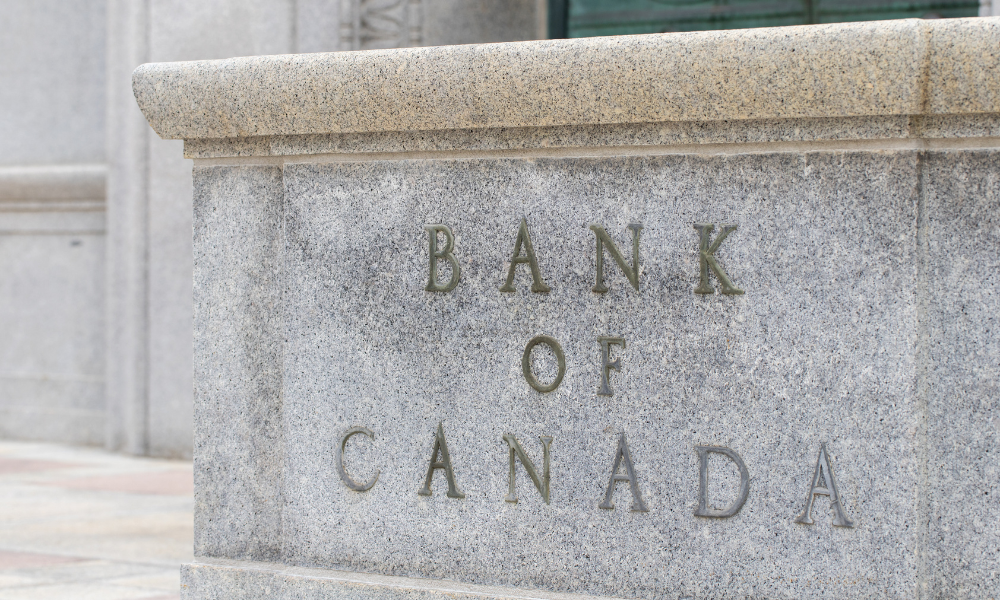Posted on
June 5, 2025
by
Charlotte Ferguson
Bank of Canada Holds Rates Steady for the Second Consecutive Meeting--But Two More Rate Cuts Are Likely This Year
As expected, the Bank of Canada held its benchmark interest rate unchanged at 2.75% at today's meeting, the second consecutive rate hold since the Bank cut overnight rates seven times in the past year. The governing council noted that the unpredictability of the magnitude and duration of tariffs posed downside risks to growth and lifted inflation expectations, warranting caution regarding the continuation of monetary easing.
The gap between the 2.75% overnight policy rate in Canada and the 4.25-4.50% policy rate in the US is historically wide. Another cause of uncertainty is the fiscal response to today's economic challenges. If the Big Beautiful Bill, now under consideration in the Senate, survives, the US is slated to run unprecedented budget deficits. The Congressional Budget Office estimates it would add roughly US$4 trillion to the already burgeoning federal government's red ink. This has caused a year-to-date rise in longer-term bond yields, steepening the yield curve.
Uncertainty remains high, and the US President just doubled the tariff on steel and aluminum to 50%, which could halt Canadian metals exports to the US. Last week's release of the first quarter GDP report at 2.2% annualized growth was stronger than expected as exports and inventories surged before the tariffs. Final domestic demand in Canada was flat. More recent data showed considerable weakness, especially in labour and housing markets. Consumer spending has also slowed sharply.
In today's press conference opening comments, Governor Macklem said, "The extreme financial turmoil we saw in April has moderated, and stock markets have recovered their losses. However, the outcomes of the trade negotiations are highly uncertain. Tariffs are well above their levels at the beginning of 2025, and new trade actions are still being threatened. The recent further increases in US tariffs on steel and aluminum underline the unpredictability of US trade policy."
"So far, the US economy has proven resilient. Imports were strong as businesses tried to get ahead of tariffs, and that pulled down first-quarter US GDP. But domestic demand remained relatively strong. Early indicators for the second quarter suggest a rebound in growth as imports fall back and domestic demand continues to expand.
The flip side of the strength in US imports was a surge in Canadian exports. This boosted first-quarter GDP growth in Canada, which came in at 2.2%, slightly stronger than the Bank had forecast.
The labour market has weakened, with job losses concentrated in trade-intensive sectors. The unemployment rate rose to 6.9% in April. So far, employment has held up across sectors less exposed to trade. However, businesses generally tell the central bank they plan to scale back hiring.
The pull forward in exports and inventory accumulation in the first quarter borrows economic strength from the future, so the second quarter is expected to be much weaker. Canadian families and businesses' spending has shown some resilience in the face of US tariffs and heightened uncertainty. But they will likely remain cautious, suggesting domestic spending will remain subdued.
Inflation excluding taxes was 2.3% in April, slightly more substantial than the Bank had expected and up from 2.1% in March. The Bank’s preferred measures of core inflation and other measures of underlying inflation moved up in April. There is some unusual volatility in inflation, but these measures suggest underlying inflation could be firmer than we thought. Higher core inflation can be partly attributed to higher goods prices, including food, and may reflect the effects of trade disruption. Many businesses report higher costs for finding alternative suppliers and developing new markets. The Bank will be closely watching measures of underlying inflation to gauge how inflationary pressures are evolving.
The Bank is also monitoring inflation expectations closely. In April, we reported that consumers and businesses expected prices to rise due to tariffs, while longer-term inflation expectations remained well anchored. Recent surveys continue to show consumers bracing for higher prices, and many businesses say they intend to pass on tariff costs.
Governing Council will continue to assess the timing and strength of the downward pressure on inflation from a weaker economy and the upward pressure on inflation from higher costs.
At this decision, there was a consensus to hold the policy unchanged as we gain more information. The BoC also discussed the path ahead for the policy interest rate. Here, there was more diversity of views. On balance, members thought there could be a need for a reduction in the policy rate if the economy weakens in the face of continued US tariffs and uncertainty, and cost pressures on inflation are contained
Bottom Line
We expect the Canadian economy to post a small negative reading (-0.5%) in both Q2 and Q3, bringing growth for the year to 1.2%, just one tick above the recently released OECD forecast for Canada. The next Governing Council decision date is July 30, which will give the Bank time to assess the underlying momentum in inflation and the dampening effect of tariffs on economic activity.
If inflation slows over the next couple of months—we get two CPI releases and two jobs reports before the next meeting—and the economy slows in Q2 and Q3 as widely expected, the Bank will likely cut rates two more times this year, bringing the overnight rate down to 2.25%.
Dr. Sherry Cooper
Chief Economist, Dominion Lending Centres
drsherrycooper@dominionlending.ca




